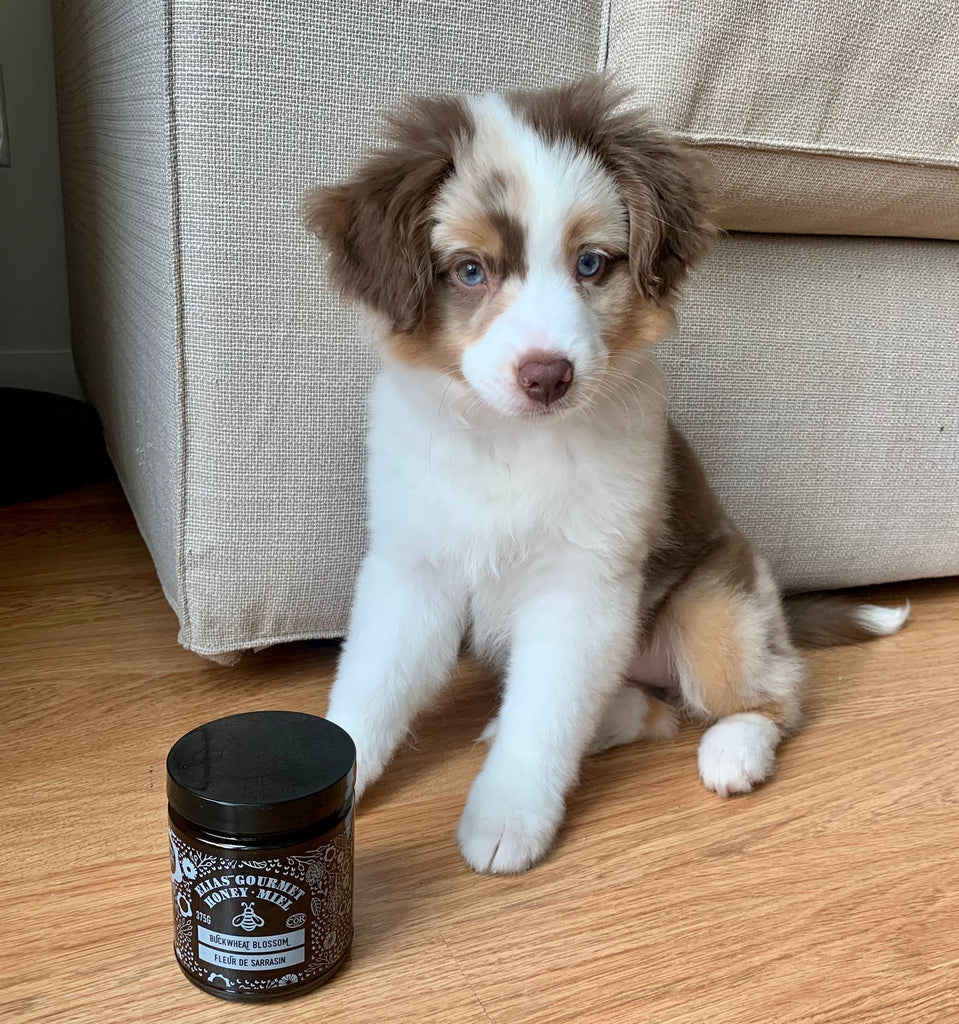Meet Juno. Juno is cute, playful… and absolutely loves honey! This got us thinking - is honey safe for dogs? The answer is yes. Honey is not only safe to be ingested by dogs but also highly beneficial.
Honey is full of antimicrobial and antifungal properties that will help your dog stay happy and healthy. It can also help control allergy symptoms, skin issues, soothe stomach ulcers and sore throats, cure allergies, and reduce inflammation - just like it does for us!
According to the American Kennel Club if your dog has a sore throat, and you have already seen your veterinarian to determine the cause and followed her treatment instructions, you can treat them with a little honey to help soothe any lingering inflammation. At the very least, it will give your dog a tasty distraction.
Here are 5 ways your dog can benefit from Honey:
1. Honey can help your dogs with it’s allergies
Honey contains anti-inflammatory compounds and trace amounts of flower pollen. This has been an immune system hack for humans for centuries - and yes, it also works for dogs! During the winter, honey can help dogs modulate allergen response, so by the time spring comes, it can help prevent an autoimmune response to airborne pollen.
Local honey is best because it contains the local pollen. Not sure if your honey is local? Check out our blog.
2. Honey to soothe your dog’s skin concerns
Another human hack - honey has been used throughout the ages to treat common skin irritations. Using honey topically on your furry canine friend is a safe and effective method to treat common symptoms such as:
- Hot spots
- Eczema
- Insect bites
- Scrapes
- Scratches
- Wounds
Because Raw honey is full of healing trace minerals and enzymes, along with antibacterial, antifungal and antiviral properties, it can help reduce infection while promoting healing. This was a common practice for humans before the advent of antibiotics, and it can most certainly benefit your dog if they are suffering from any of the above symptoms.
3. Honey for coughing and throat irritation
You may have already determined this from your own experience… Raw honey can do wonders for soothing a sore or itchy throat. The same goes for your dog.
If your dog has kennel cough or other breathing irritations, honey is a great way to provide some sweet and soothing relief.
4. Honey to improve your dog’s digestive issues
Does your dog have trouble with digestive issues:indigestion, constipation, or diarrhea?
A bit of honey daily honey can be an effective way to help with these stomach upsets. Honey contains both prebiotics and probiotics. And these play a big role in healthy digestion.
5. Honey for managing weight
Studies have shown that eating honey can slow down the hunger response. Honey is a simple sugar, but it breaks down differently than table sugar. It requires less insulin and is absorbed more slowly into the bloodstream. This means it may slow down digestion and the conversion of glucose.
If your dog puts on weight easily, adding a bit of honey may help him maintain a healthier weight.
Here are some fun recipes you can make for your dog with Elias Honey:

- Peanut butter, oatmeal, honey recipe treat recipes
- Peanut Butter, Bacon and Honey Dog Treats
- Sweet Potato Carrot Dog Cake
Dogs are our best friends and we always want to make sure they are healthy, happy and well taken care of! We are always wondering what is the best diet to follow and what foods are safe for them to consume - and we think adding a bit of honey is a pretty sweet way to keep them healthy.
For further information about what you can and can’t feed your dog, home remedies and supplements, please , consult your veterinarian. Also note that raw honey should not be fed to puppies or dogs with compromised immune systems, or given to diabetic or obese dogs.




